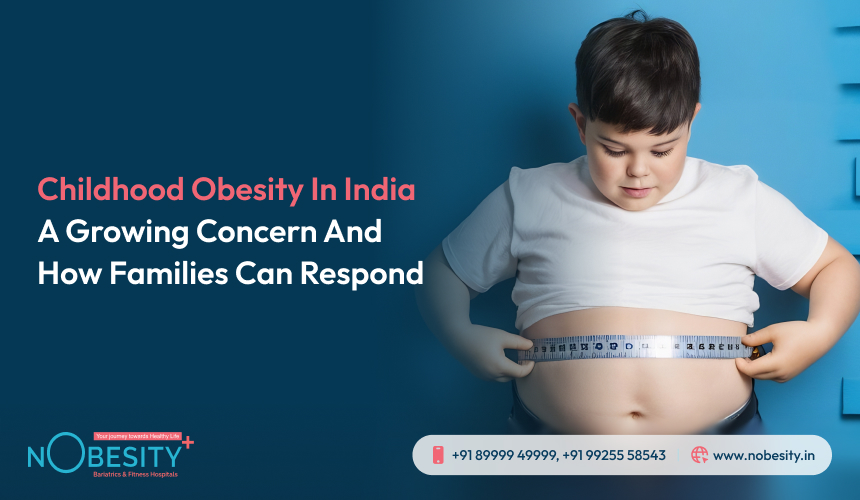Childhood Obesity in India: A Growing Concern and How Families Can Respond


For years, India has made great strides in combating malnutrition, but today, we face a new and rapidly growing challenge: childhood obesity. If left unaddressed, this issue has the potential to become a full-blown public health crisis, with devastating effects on the long-term health and well-being of our children.
According to UNICEF’s World Obesity Atlas for 2022, India is predicted to have over 27 million obese children by 2030, representing one in every 10 children globally. These children are already at risk for serious health issues like type 2 diabetes, heart disease, and metabolic disorders, conditions once reserved for adults.
As rapid urbanization continues, screen addiction rises, and processed foods dominate, childhood obesity has evolved into a silent epidemic that demands urgent attention. This blog explores the harsh reality of childhood obesity, its status as a growing public health emergency, and, most importantly, how families can take charge to protect their children’s future health. The clock is ticking!
Childhood obesity is defined as when a child’s weight is significantly higher than what is considered healthy for their age, height, and gender. One of the most common tools to assess obesity in children is Body Mass Index (BMI), which is calculated as:
BMI=Weight(kg)/ Height(m)2
For children, BMI is assessed using BMI-for-age charts specific to gender and age, developed by organizations like the World Health Organization (WHO). These charts help healthcare providers determine if a child’s BMI falls within a healthy range.
While BMI is a useful screening tool, it doesn’t provide the whole picture. Additional assessments, such as body fat percentage and fat distribution, are crucial for a more complete understanding of obesity. As childhood obesity becomes more prevalent, understanding these basics is the first step toward effective prevention and treatment.
Childhood obesity is a multifactorial condition, and understanding its underlying causes is crucial for developing effective prevention and intervention strategies. These causes can be broadly categorized into genetic factors, endocrine factors, lifestyle choices, and environmental influences.
Childhood obesity increases the risk of chronic health issues like diabetes and heart disease, affecting both immediate well-being and long-term development. Its medical impact cannot be ignored.
Childhood obesity is a serious condition that affects both physical and mental health, with long-term risks for diseases like diabetes, heart disease, and emotional struggles. Early intervention is key to preventing these complications and promoting lifelong well-being.
The consequences of childhood obesity go beyond the scale, impacting not only physical health but also emotional well-being and long-term quality of life.
Tackling childhood obesity begins at home, where small, consistent changes can make a big difference. From balanced meals to active playtime, the strategies outlined below are backed by research and are designed to help parents take proactive steps in preventing obesity and promoting healthier lifestyles for their children.
For children with severe obesity, bariatric surgery may be considered when other treatments haven’t worked.
When a child’s obesity is resistant to lifestyle modifications, and they have serious obesity health risks, bariatric surgery might be the most effective option. Surgery is usually considered when the child’s BMI exceeds 40 or exceeds 35 with obesity-related health problems.
Bariatric surgery offers significant weight loss benefits but comes with risks. Short-term risks include infection, blood clots, and complications from anesthesia. Long-term risks can include nutrient deficiencies, as the surgery reduces the body’s ability to absorb essential vitamins and minerals. Supporting a child through obesity management starts at home. Families play a crucial role in fostering a healthy environment and promoting lasting, positive changes in diet and lifestyle.
Children dealing with obesity often face challenges like low self-esteem and body image issues. Addressing these emotional factors is key to their success in managing weight and adopting healthier habits.
Counseling and cognitive-behavioral therapy (CBT) play a crucial role by helping children understand the psychological aspects of overeating and emotional triggers. Support groups can also provide a sense of solidarity, where children learn they are not alone in their struggles. Parents have the power to create a supportive, nurturing environment at home. Leading by example, offering encouragement, and helping children set realistic goals can significantly improve their chances of long-term success. The emotional support from family, combined with practical strategies, creates a strong foundation for lasting change.
Childhood obesity is preventable, and it’s never too early to start. With early intervention, the right strategies, and ongoing support, we can ensure our children grow up strong, confident, and healthy.
NObesity offers personalized programs tailored to each child’s needs, including expert guidance on diet, exercise, and emotional well-being. For children with severe obesity, NObesity also provides access to bariatric surgery, a medical solution when lifestyle changes alone are insufficient. Their team of experienced professionals is committed to helping families make informed decisions and offering comprehensive support for a healthier, brighter future.